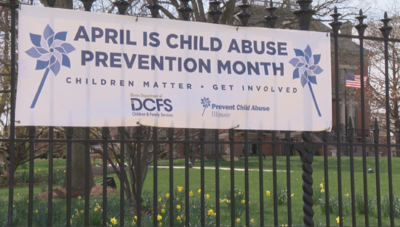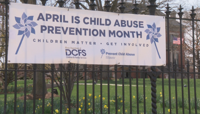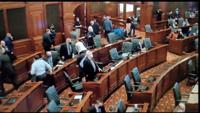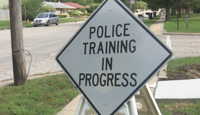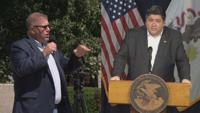SPRINGFIELD (ILLINOIS CAPITOL BUREAU) -- April is National Child Abuse Prevention Month, but child welfare experts feel it is critical during the stay-at-home order. Some guardians are dealing with increased frustration and anxiety, which could lead to further abuse of their kids. The Illinois Department of Children and Family Services says the number of abuse calls to their hotline has dropped significantly since the coronavirus pandemic started, but they know abuse is still occurring. Spokesman Jassen Strokosch says child abuse is harder to track without children seeing mandated reporters in person.
"It's on us as agencies to take some initiative"
DCFS and child welfare providers are discussing how to support children who are the most vulnerable during this stay-at-home period. That includes youth in care, as well as the exponential number of kids outside of the DCFS system.
"We've been reaching out to parents that we've served in the last 18 months to check on them to see how they're doing," said Safe Families Alliance National Director Ryan Mobley. "So I know those conversations are happening."
Mobley says many organizations are trying to provide new ways for children and guardians to speak with experts. They are using several virtual options like Zoom, Skype, and FaceTime. He adds that DCFS has also transitioned to video-conferencing for investigations, since in-person visits have been suspended following social distancing guidelines from the CDC and Gov. JB Pritzker.
"We're very concerned for these kids and their parents." Mobley believes every child welfare agency should be taking some initiative help during this challenging time. Prevent Child Abuse Illinois agrees that this is an important move. "All children deserve great childhoods and we all have a role to play in keeping them safe," said Denise McCaffrey, PCA Illinois Executive Director.
Keeping kids safe
Rep. Anna Moeller (D-Elgin) says lawmakers are planning a conference call with DCFS Director Marc D. Smith next week. She explained that they want to ensure the department is doing everything they can to keep kids safe. Additionally, Moeller says teachers should be even more vigilant for warning signs during this virtual learning period.
"If you think that something is wrong - if a child has not connected at all during this time and is hard to reach - that may be a red flag," Moeller explained. "That might be a warning sign that greater intervention is needed."
Cook County Public Guardian Charles Golbert emphasized that children are uniquely vulnerable during this pandemic due to many risk factors. Golbert says school officials account for more than half of the child abuse reports to DCFS. "It's more important than ever that people step up," Golbert said. "People cannot just assume that others will see bad these things going on."
If you see something, say something
Although the state's Child Abuse Prevention Month kickoff events have been canceled, providers still want people to spread the word. If you see something, say something. "Call 9-1-1, call the child abuse hotline. Call organizations like Safe Families, call someone you know that you think cares - whether it's a local church or your neighbor," Mobley emphasized. "If a parent or child is feeling unsafe, we've gotta continue to get the word out of the means they can reach out for help."
If you see or hear about any form of child abuse, call the DCFS hotline at (800) 252-2873. Golbert suggests that people should call police before they dial the DCFS hotline. Abuse hotline operators are working remotely during the pandemic, but Golbert says they are still available 24/7.
Meanwhile, Golbert and Moeller hope lawmakers will keep child welfare as a high priority when they return to Springfield. There are several DCFS reform bills moving through the Capitol and Moeller says the Department will still need significant funding from the FY21 budget. She recognized the important step lawmakers took last year to allocate more resources to the department. Moeller explained DCFS was able to hire additional workers and provide extensive training for those on the frontline.
"But there's certainly more that has to be done, and whether that happens when we come back for a brief time in the spring or if we do it in the fall, we'll keep working so there are necessary changes to make sure all of our Illinois children are safe," Moeller added.
However, Golbert said that task will be harder than most may think. "All the problems that existed in DCFS before this pandemic started needed reforms. They'll still be there when this ends. Sadly, they may even be worse."

